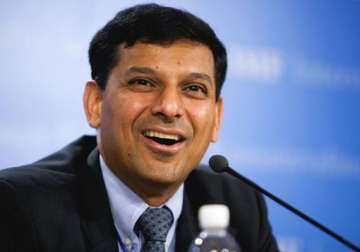Mumbai: Concerned over impact of weak monsoon on food price, RBI today decided to keep the key policy rate unchanged but slashed statutory liquidity ratio (SLR) by 0.5 per cent to unlock about Rs 40,000 crore into the system.
RBI Governor Raghuram Rajan, who has for the third time in a row kept the rate unchanged, said there are upside risks to inflation in view of uncertain monsoon and its impact on food production as also volatile international oil prices.
"It is...appropriate to continue maintaining a vigilant monetary policy stance as in June, while leaving the policy rate unchanged," he said third bi-monthly review of the monetary policy in Delhi.
Accordingly, the repo rate will continue to stand at 8 per cent, the reverse repo at 7 per cent and the cash reserve ratio at 4 per cent. The bank rate would remain at 9 per cent.
In order to infuse additional liquidity, Rajan decreased SLR for banks by 0.50 per cent to 22 per cent with effect from the fortnight beginning August 9. A similar move in June had released an additional Rs 40,000 crore into the system.
Additionally, Rajan also said that RBI will continue to provide liquidity under overnight repos at 0.25 per cent and liquidity under the 7 and 14 day repos of up to 0.75 per cent of net demand and time liabilities.
On retail inflation, which cooled down to 7.31 per cent in June, Rajan said that while achievement of the 8 per cent target for January 2015 is not a worry, there are "upside risks" to its ambitious target of lowering it further to 6 per cent by 2016.
This warrants a "heightened state of policy preparedness," he said, adding that supply will increase with the government measures on food management and project completion.
"The RBI will act as necessary to ensure sustained inflation," said Rajan, who has often surprised with hawkish, anti-inflationary policies.
On growth, he said the central estimate of 5.5 per cent GDP growth for 2014-15 can be sustained and added that prospects for growth have "improved modestly".
"Sentiment on domestic economic activity appears to be reviving," Rajan said.
Inflation measured by consumer prices cooled down to a 43-month low of 7.31 per cent for June, while the factory output came in at 4.7 per cent in May, the highest in the last 9 months.
Factors like these had led to expectations of Rajan holding the key rates at the policy review. The next review of the policy will be on September 30, he said.
Latest Business News
